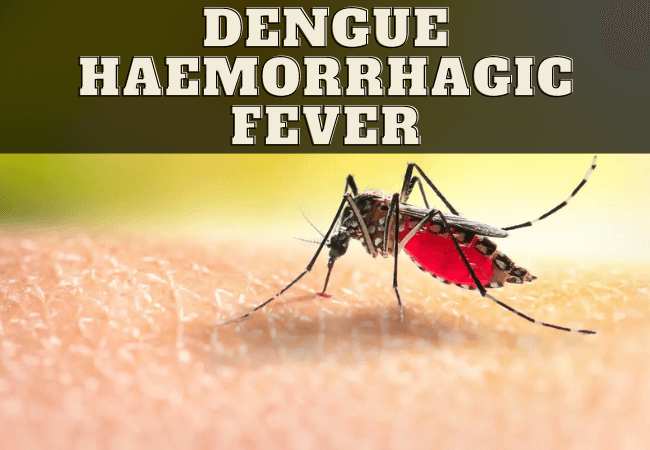Definition of Dengue Haemorrhagic Fever (DHF):
According to WHO, dengue hemorrhagic fever is defined as “a dengue like illness with thrombocytopenia (100 x 10˄9/L) and a hemoconcentration (hematocrit elevated by 20%). It is a much more severe disease than classical dengue fever, with a fatality rate that approaches 10%.

Management of Dengue Haemorrhagic Fever (DHF):
a) Management of DHF during the febrile phase is similar to that of dengue fever.
b) Oral electrolyte solution of fruit is juice is recommended during the febrile phase.
c) Monitor:
- Platelet count and Hct value should be estimated at least daily.
- Frequent recording of vital signs is recommended for adjusting replacement avoiding over hydration.
d) Fluid therapy: A rise of haematocrit of 20 or more indicates the need for IV fluids therapy.
- Ringers lactate solution,
- 9% W/V normal saline,
- 5% dextrose in half strength normal saline solution.
e) Blood transfusion: In case of significant/ severe bleeding.
f) Shock: In case of shock give oxygen.
g) Acidosis: For acidosis use sodium bicarbonate.
h) Evaluation of patient’s condition:
- Frequent recording of vital signs,
- Pulse, BP, respiration and temperature every 30 minutes,
- Monitoring of urine output,
- Platelet court and haematocrit determination,
- Haematocrit level 2 hours for first 6 hours then every 4 hours,
- Fluid balance sheet.
Clinical Laboratory Investigation of Dengue Haemorrhagic Fever (DHF):
It includes the following:
- Haematocrit – increase 20%,
- Platelet count – Thrombocytopenia,
- WBC count and DC,
- Coagulograme: PT, partial thromboplastin time, fibrinogen level and fibrinogen degradate products,
- Serum protein particularly albumin,
- Liver function tests,
- Serum electrolyte particularly sodium,
- Blood gas analysis,
- Renal function and urine examination,
- Serum complements,
- Stool examination OBT,
- ECG,
- Chest X-ray,
- USG of abdomen,
- Plus,
- Diagnosis for dengue – virus isolation and serology (IgM and IgG).
Complications of Dengue Hemorrhagic Fever:
All the complications of dengue hemorrhagic fever have listed in the below:
1. Intracranial bleeding,
2. Encephalopathy,
3. Convulsions,
4. Renal failure,
5. Hepatic failure,
6. Hemolytic uremic syndrome,
7. Iatrogenic problems like-
- Sepsis,
- Pulmonary edema,
- Over-hydration,
- Electrolyte imbalance.
More questions related to this article:
- What is dengue haemorrhagic fever?
- Outline the principles of management of dengue hemorrhagic fever.
- How will you treat a case of dengue hemorrhagic fever?
- Write down the management of dengue fever.
- Discuss the management of dengue haemorrhagic fever.
- Write down the clinical laboratory investigation of DHF.
- What are the complications of dengue hemorrhagic fever?

Maria Khatun Mona is a Founder and Editor of Nursing Exercise Blog. She is a Nursing and Midwifery Expert. Currently she is working as a Registered Nurse at Evercare Hospital, Dhaka, Bangladesh. She has great passion in writing different articles on Nursing and Midwifery. Mail her at “maria.mona023@gmail.com”
